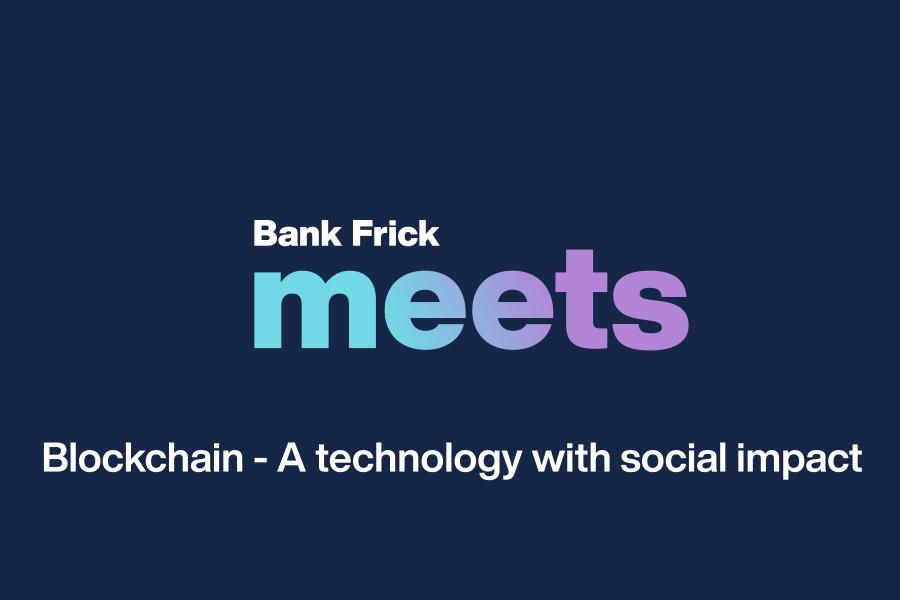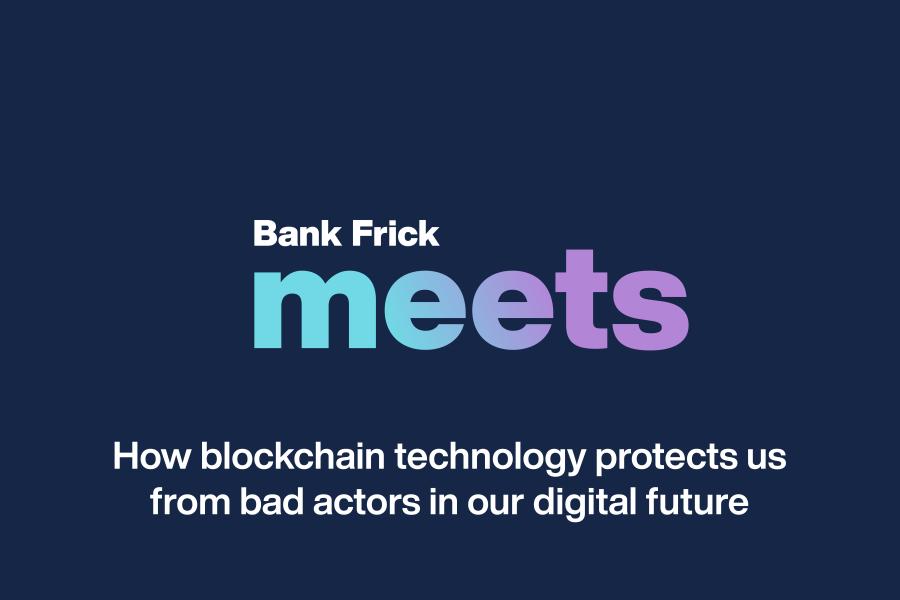«Bridging the worlds of blockchain banking and classic banking – We are the future of finance»
The borders between the worlds of blockchain banking and classic banking are becoming more and more fluid. Beneficiaries of the crypto boom are increasingly seeing the advantages that traditional, less volatile asset classes offer in terms of diversification and investment options. At the same time, classic financial intermediaries are increasingly interested in the dynamic new world of blockchain banking.
The international blockchain scene is generating new ideas and business models on a seemingly daily basis. Companies whose daily business revolves around cryptocurrencies or blockchain technology have an enormous need for business accounts and thus access to fiat currencies. Bank Frick delved into the subject of blockchain and fintech very early on and therefore has demonstrated expertise in this area – both in terms of technical issues and for questions about regulatory matters and compliance. As a result of this experience in blockchain banking, we are able to grasp the business ideas of crypto companies and are thus also in a position to establish a corresponding business relationship. As a bank, we are experiencing a veritable boom through these developments – although we proceed very selectively in granting accounts to clients in the blockchain area and follow a strict onboarding process.
From the crypto to the classic banking world
Successful crypto entrepreneurs and investors are increasingly scouting around for classic financial services, such as asset protection and diversification of the investment portfolio. It is important to these clients for their interlocutor to know how they made their money and at the same time to be able to advise them how they can grow and protect their crypto assets with the help of classic investments.
Cryptocurrencies have become respectable
Since the start of the coronavirus pandemic at the latest, digital money has been attracting the attention of the public. The topic has become mainstream, with even the tabloid media now reporting on cryptocurrencies. Crypto assets are becoming increasingly popular as an asset class – accompanied in equal measure by a growing demand for corresponding banking services. This is also confirmed by our observations on the market. Financial intermediaries are more and more frequently being asked by clients about blockchain projects or the ability to make initial investments in cryptocurrencies. We have built a very sophisticated infrastructure in this regard, one that offers our clients the greatest possible convenience without compromising on security.
Moreover, we are happy to act as the first point of contact in Liechtenstein for real-world reports or a review of case studies. We are pleased to offer our established processes to financial intermediaries and professional clients in order to help them develop potential business cases.
Close collaboration between Team Blockchain Banking and Team Classic Banking
The classical financial world is continuing its march towards consolidation with blockchain-based assets. Our Blockchain Banking and Classic Banking departments work closely together and continuously monitor the market to ensure that our solutions meet the quality requirements of our clients. Every day they work to develop additional ways to link the classical financial world with blockchain-based assets.
Trust and reliability as basic values
Whether blockchain banking or classic banking: in both areas, a long-term, successful business relationship is based on values, such as trust and reliability. As a bank that is entirely family run and has been on the market for more than 20 years, we will always be there for our clients regardless of whether in five years the world becomes all about tokenisation and cryptocurrencies or, contrary to expectations, the trend levels off or completely comes to an end. With one foot in the world of blockchain and the other in the world of classic banking, we have created a solid foundation and are ready for the future.
Share post


Related Posts

How Blockchain Enables Transparency and Efficiency
Blockchain technology, first demonstrated in 2010 through a historic Bitcoin transaction, has evolved far beyond cryptocurrencies, offering solutions for transparency, efficiency, and decentralization across industries. Its core principles—decentralization, transparency, and immutability—enable secure, peer-to-peer transactions without intermediaries. Innovations like Ethereum's smart contracts have expanded blockchain's capabilities, impacting supply chains, automation, and governance.
Despite concerns about energy use, modern blockchains are increasingly energy-efficient, and misconceptions about complexity or security often stem from misunderstandings. For nonprofits, blockchain offers transformative potential: donations can be transferred quickly, cost-effectively, and transparently, ensuring more funds reach beneficiaries while improving accountability and impact measurement.
As blockchain reshapes societal structures and trust, it presents nonprofits with powerful tools to amplify their impact. Organizations willing to embrace this innovation will be well-positioned to drive meaningful change in an interconnected digital world.

Insights into the process of designing AMCs
Since their introduction, Actively Managed Certificates (AMCs) have become a significant component of the European financial market. As a structured product, legally classified as debt securities, they hold a counterparty risk for the investor that is comparable with other structured financial products. AMCs are securitised, which gives the holder the right to cash repayment or the delivery of an underlying asset. As the buyer, the investor becomes a creditor of the issuer and thus dependent in terms of the type and amount of repayment, which is subject to different parameters.

Direct market access – efficient trade execution for fund strategies
Liechtenstein has a long-standing tradition in the fields of banking and asset management. Since joining the EEA in 1995, Liechtenstein’s financial centre has established itself as a professional point of reference for promoters of collective investment vehicles on the European financial market.

Ensuring the future of insurance with blockchain technology
The insurance market is an essential part of the global economy, covering both personal and business risks. Thus, it is no wonder that it is one of the largest industries in the world, boasting an estimated value of about USD 5 trillion and employing about 2.7 million people across the globe. Out of USD 5 trillion, around USD 3.7 trillion makes up the value of the global life insurance market, while the value of the property and casualty insurance market carries a value of USD 1.3 trillion.

Tokenisation: A new way of representing assets
Ever since the dawn of time, human beings have hunted and gathered, collecting the things they discovered and making them their own. This was when the concept of ownable assets first emerged, albeit in rudimentary form. Since then, assets have evolved and become more complex as humans have found more reliable ways to connect assets to people. Today, people enter into legal contracts when transferring assets.

Blockchain: A technology with social impact
Foundational technology is the most effective tool for impacting society at large and solving the challenges it is faced with. One such foundational institutional technology is the blockchain, which entered the picture through the discovery of Bitcoin in 2009 and has since proliferated and emerged in many different forms.
What does blockchain’s social impact look like?

How blockchain technology protects us from bad actors in our digital future
The blockchain industry has experienced significant growth in the last couple of years as one unicorn after another sprouts from the soil that grows crypto start-ups. In this new series of blog posts and webinars, we take a closer look at the technology and explore why it is so successful and why everybody is talking about it. We also look beyond the speculative aspect that blockchain is so frequently associated with and focus on the real-world problems that the technology is poised to solve.

Wie klassische Finanzintermediäre in der Krypto- und Blockchain-Welt Fuss fassen können
Mit zunehmender Selbstverständlichkeit fragen immer mehr Kunden nach Dienstleistungen rund um Kryptowährungen. Für Finanzintermediäre eröffnet diese Nachfrage neue Geschäftsmöglichkeiten. Um das Potenzial heben zu können, müssen die Akteure aber auch das Spezialwissen zur Verfügung haben.

Blockchain technology reinvents correspondent banking – just not yet
As one of its major use cases, blockchain technology is said to transform traditional correspondent banking. So far major challenges have pushed back this transformation. It is more likely than ever that with central bank digital currencies on the horizon; blockchain disruption will finally come to fruition in the realm of cross-border banking.

Turning crypto investment into an earning asset
With Ethereum upgrading to Proof of Stake, the crypto world is going through one of its most transformative shifts to date. This means that customers will soon be able to earn interest on their digital asset holdings through a process called staking. What staking is, how it will define the future of Ethereum and digital asset custody at large is explained in this article.